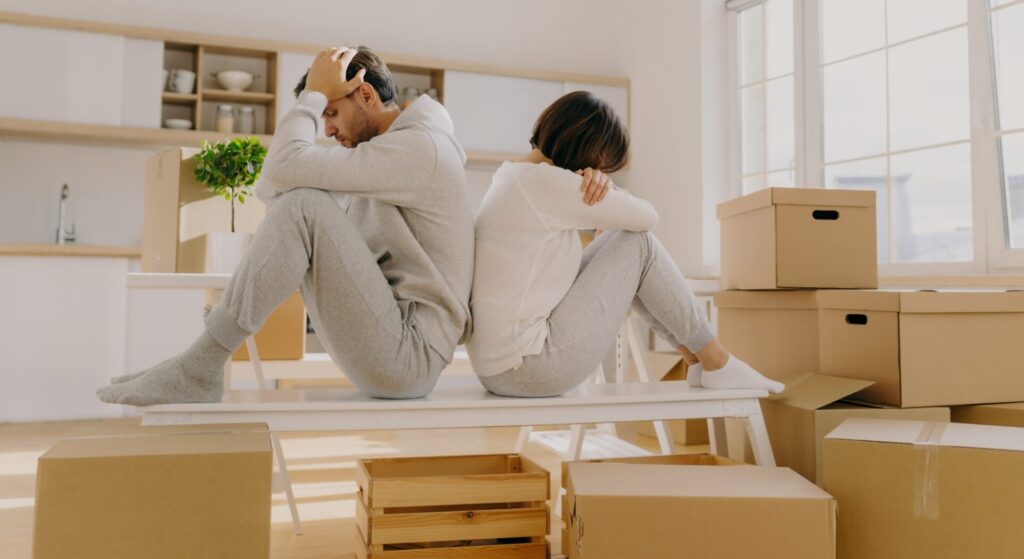How Does Filing for Bankruptcy Affect Divorce Proceedings?
Going through a divorce is a complicated and often intimidating experience on its own. Some divorces may move fairly quickly, with each spouse just looking to bring an end to the process as fast as possible. Other divorces are more frustrating and slow, with the spouses drawing out the divorce because they simply can’t agree on terms. However, this is only one of the ways to slow down a divorce.
Another way to slow a divorce down is to file for bankruptcy in the middle of it. It may sound like a crazy thing to do; after all, wouldn’t it just be easier to finish the divorce and then file for bankruptcy?
Bankruptcy and Divorce
But there can be a number of valid reasons why you or your spouse might file for bankruptcy during your divorce. We’ll talk about these reasons more in a moment; first, let’s see what happens when you file for bankruptcy during divorce proceedings.
When you file for bankruptcy, the first thing that happens is that your creditors are blocked from coming after you for what you owe. If you fail the bankruptcy, such as failing to make payments on a Chapter 13 bankruptcy, then you will end up back where you started.
But if you are able to move forward with the bankruptcy, then you could have your debts discharged. This is fantastic for the individual that filed for bankruptcy, but it can really mess with a divorce.
When you or your partner file for bankruptcy during divorce, certain divorce proceedings can move forward while others cannot. Issues related to child support or spousal support can be worked out while bankruptcy proceedings are occurring.
Unfortunately, a major part of the divorce process is the equitable distribution of marital assets. Since bankruptcy typically involves the selling of assets, these two processes interfere with each other. Therefore the bankruptcy must be resolved before the divorce can be finished.
It can be difficult to say how much time will be eaten up while you wait for the bankruptcy to be resolved. Chapter 7 bankruptcy is the best form of bankruptcy when going through a divorce since it is the fastest to be resolved. Meanwhile, on the other hand, a Chapter 13 bankruptcy could take three or five years to resolve.
Can I Stop My Spouse from Filing for Bankruptcy?
If you and your spouse are still on good terms, you may be able to stop them from filing for bankruptcy by discussing the matter with them. However, when it comes to legal options, there are none. Your spouse has a right to file for bankruptcy whenever they want; this could be prior to the divorce, in the middle of the divorce, or after the divorce. It might really throw a wrench into your plans, but there is nothing that can be done to prevent it.
In some cases, bankruptcy can be avoided or at least postponed through divorce mediation. This is a process whereby a divorcing couple meets with a neutral attorney to come to some kind of agreement about the terms of the divorce.
However, in many cases, an individual may have no choice but to file for bankruptcy because of how the divorce is affecting their financial situation.
Filing for bankruptcy is a serious financial decision, and it often comes after careful consideration of all other options. If your spouse is considering bankruptcy, it’s important to understand the reasons behind this choice. Divorce can drastically change a person’s financial circumstances, including income levels, debts, and obligations. Sometimes, debts that were manageable during the marriage become overwhelming when faced alone.
Bankruptcy can provide relief by discharging unsecured debts such as credit card balances, medical bills, and personal loans, offering a fresh financial start. However, it also has consequences, including impacts on credit scores and potential loss of certain assets. Open communication between spouses, even during divorce, can sometimes lead to alternative solutions like debt restructuring or negotiation with creditors.
If mediation or negotiation isn’t successful, and your spouse proceeds with filing for bankruptcy, it is advisable for you to seek legal advice from both a divorce lawyer and a bankruptcy attorney. These professionals can help you understand how the bankruptcy filing may affect your divorce proceedings, property division, and your own financial responsibilities. Being informed and proactive can help protect your interests during this complex time.
Why Would Somebody File for Bankruptcy During a Divorce?
When you are single, your bills reflect your own personal financial situation. You wouldn’t take on a mortgage that you couldn’t afford, for example. But when you are married, there are two of you, and typically twice the income. This can allow for important purchases for the family, such as a family home that fits everybody.
When you get divorced, you are returning to a single income. Many people find that they can’t keep up with things like mortgage payments or other major expenses now that they are on their own. Filing for bankruptcy is often the best way to escape from creditors, even if you are in the middle of a divorce.
Filing for bankruptcy will have the negative effect of stretching out the divorce process. However, this is often worth doing in order to get protection from your creditors. This means that instead of losing the home immediately, you can put a pause on things to give you the time to sort out your options.
Ultimately this could mean moving to a less expensive home, restructuring your debt to keep the family home or other potential options. It’s best to speak with an attorney about what options are right for your unique situation.
How Will I Be Affect If My Spouse Files for Individual Bankruptcy?
Generally speaking, you shouldn’t be overly affected if your spouse files for individual bankruptcy. If you are going through a divorce, the process will be slowed down, and this can be quite annoying.
The biggest problem comes in situations where you and your spouse jointly own property. It may result in your spouse’s portion of the property being taken. But it could also result in the jointly-owned property being sold in order to divide it properly.
One thing people often worry about is whether or not their IRA accounts or life insurance accounts will be affected. Except in rare cases, there are protections in place to prevent too much damage from being done to your accounts because of bankruptcy.
In addition to property concerns, joint debts can also be impacted when one spouse files for bankruptcy. Even if only one spouse files individually, creditors may still pursue the other spouse for repayment of joint debts such as credit card debt, personal loans, or medical bills. This can create financial strain on the non-filing spouse, especially if the divorce has not yet addressed responsibility for these debts.
It is also important to understand that filing for bankruptcy does not automatically relieve either spouse from domestic support obligations such as child support or alimony. These obligations are typically considered priority debts and are not dischargeable in bankruptcy. Therefore, even if your spouse files for bankruptcy, they remain responsible for these payments as ordered by the divorce court or divorce decree.
Lastly, the involvement of a bankruptcy trustee means that your spouse’s assets and financial affairs will be reviewed closely. This process can affect the timing and outcome of property division in divorce proceedings. The automatic stay imposed by the bankruptcy court can temporarily halt certain actions related to marital property, which may delay the finalization of the divorce.
Overall, while your spouse’s individual bankruptcy filing can complicate divorce proceedings and joint financial matters, understanding these impacts can help you better prepare and seek appropriate legal advice to protect your interests.
Filing Bankruptcy Before Divorce
That is a hard question to answer. Since your spouse is filing for bankruptcy, you may also find yourself in an untenable situation due to the divorce. But you could also have done a much better job taking care of your personal finances and obligations, so this might not necessarily be true.
The best thing to do if you think you might need to file for bankruptcy is to speak to a bankruptcy attorney. A knowledgeable professional will be equipped to handle any questions you may have, point you toward the options they think are most appropriate, and advise you on whether it is better for you to file for bankruptcy during your divorce or to wait until it has been finalized.








